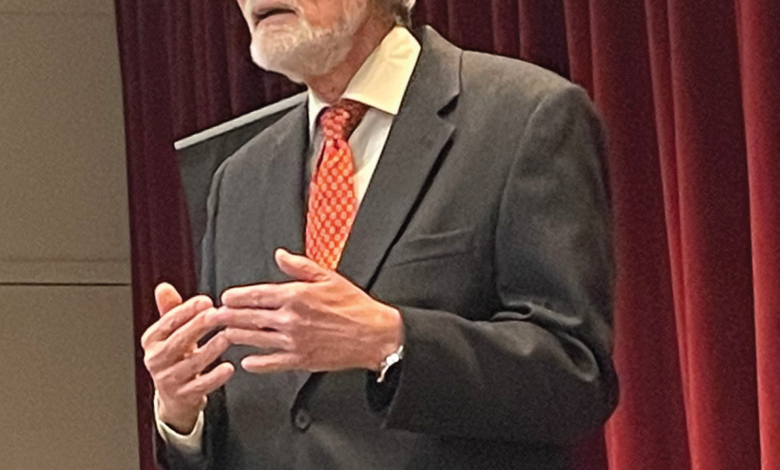
Renowned Sovietologist speaks on war
By Kaitlyn McCormick
STANDING at the front of the Rue Auditorium without notes, slides or even a microphone, Alexander Motyl captured the attention of nearly 40 silent audience members. Motyl, a political science professor at Rutgers University Newark, Sovietologist and this year’s speaker for Rider’s 29th Annual Levine Lecture presented “The Russo-Ukrainian War: One Year After,” on March 27.
A son of Ukrainian immigrants and a former administrator at Columbia University’s Harriman Institute, Motyl has both the personal and academic experience to discuss the ongoing war in Ukraine.
When he got into the field of Sovietology, the study of policies and practices of the Soviet Union, Motyl said in an interview with The Rider News before his lecture, there were “probably about 30 or 40 people in the country who were interested in those issues.” The fall of the Soviet Union and the period around 1988-92 soon gave people in Motyl’s profession their “time in the sun.”
From her place on the auditorium stage, history professor Nikki Shepardson, who organized the event and delivered the introduction for Motyl, asked the audience how many of them were not alive when the USSR fell. The responses were mixed in the faces of audience members that spanned generations, some taking notes and others wearing their support for Ukraine through yellow and blue masks, ribbons and other accessories.
Motyl spent the next 90 minutes recounting to an engaged audience his take on the Russo-Ukraine war, emphasizing arguably the most important point from his lecture and one he shared that he hopes audience members walk away with.
“This isn’t just a war … that began in Feb. 2022,” Motyl said. “It’s a war that began in 2014, but, more than that, it’s a genocide. We are witnessing a genocide.”
Motyl discussed key elements of the war, contextualizing for the audience both Putin and Ukraine’s history, theorizing war tactics, running over statistics of death counts and military supply as well as a multifaceted approach to dissecting the ideologies at play.
The annual Levine Lecture is endowed by the family of late professor Emanuel “Manny” Levine, who predated Rider’s history department.
For the entirety of this year’s presentation and the lively Q&A session that followed, a piece of Motyl’s expertise was imparted on a watchful audience.
Patrick Luckie, a junior history and secondary education major, said he was so excited for Motyl’s lecture that he got to the auditorium early to claim a seat. He shared that because he came in as a freshman during the height of the COVID-19 pandemic, he did not have the opportunity to attend a Levine Lecture in 2020, but after hearing last year’s presentation on the Civil Rights Movement, he made a vow to come back.
“I found it so interesting that I cleared it up on my calendar and made sure that as long as I’m at Rider I’ll keep coming back to this event,” Luckie said.
The future educator also shared that he came in with the intent of gaining the experience of learning from a qualified source like Motyl. “Having someone who has the credentials come in and talk about [the Russo-Ukraine War] is a breath of fresh air, especially when there’s so much uncertainty right now,” he said.
Students like Luckie, however, were not the only audience members.
Larissa Kebuz not only has a son that attends the university, but she is an active member of Philadelphia Ukrainian community who found out about the event through psychology professor and outspoken Ukrainian advocate Chrystina Dolyniuk.
“When we grew up and told anybody we were Ukrainian, 90% of the time their response was, ‘Oh, is that kind of like Russian?’” Kebuz said, speaking for herself and the friend she had attended with. To see Ukraine being discussed at a university of Rider’s stature with a high level of interest and a speaker of Motyl’s caliber was, as Kebuz described, “mind blowing.”
“It’s really impressive how far the knowledge about Ukraine has come in this country,” Kebuz said, also expressing her excitement at the number of young, non-Ukrainian attendees present.
Shepardson, the chair of the history and philosophy department and organizer of the event, expressed her gratitude to the Levine family for endowing this lecture series which allows for experts like Motyl to not only share with students, but also with university faculty, staff and members of the surrounding community.
“I realized a lot of our students weren’t aware … of what was going on. They knew there was a war … but I don’t think they understood what was behind it, and I thought it was really important for us to bring in an expert in the area to speak on it,” Shepardson said.
And it is the perceived hope of Motyl that the profundity of the war remains impacted on those in attendance.
“If Ukraine loses, Russia wins. If Russia wins, we’re dead ducks,” Motyl concluded.


